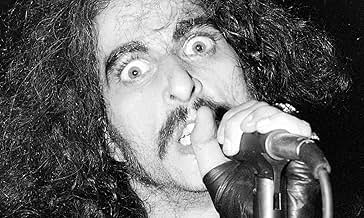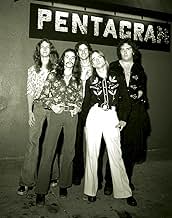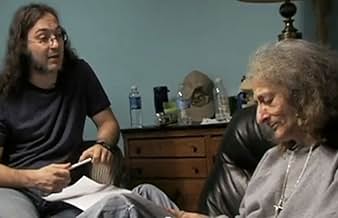IMDb RATING
7.5/10
2.1K
YOUR RATING
Documentary follows Bobby Liebling, lead singer of seminal hard rock/heavy metal band Pentagram, as he battles decades of hard drug addiction and personal demons to try and get his life back... Read allDocumentary follows Bobby Liebling, lead singer of seminal hard rock/heavy metal band Pentagram, as he battles decades of hard drug addiction and personal demons to try and get his life back.Documentary follows Bobby Liebling, lead singer of seminal hard rock/heavy metal band Pentagram, as he battles decades of hard drug addiction and personal demons to try and get his life back.
- Awards
- 1 win & 4 nominations total
Sean Pelletier
- Self
- (as Sean 'Pellet' Pelletier)
Featured reviews
It's 2022 and I randomly came upon upon this documentary and hit play without actually knowing what it was about The minute he pulled that Pentagram album I stood up , I was standing there 4 feet from the television for most of this. The year was 1983ish for me, I had access to albums , my parents being collectors, my dad being a DJ and my uncle in the entertainment industry . Metal however, was my passion and happening upon this very record changed the course of my endeavors . Up to that point I had the sense that good music would certainly be found in the studio or in the massive collection in our home. At the time rap and metal were newer , still ,in retrospect a decent amount came through out household . Sitting there, listening to my record haul that day , I had a very deep sense of the world being unfair and was more upset than excited to learn that there was music out there beyond what was accessible ( even to me) much of the documentary tells a story of what could have been the collective experiences of a generation however this individual.... Typically I keep my reviews and personal experience separate but this documentary , I .... I shouldn't give spoilers so that's it. Thank you.
I saw Robert Oscar Liebling and Pentagram in Socorro, New Mexico in 1974 -- just before I separated from the military. They'd boarded a bus somewhere in Pennsylvania headed for Secaucus, New Jersey, but a couple of them apparently were ticket-impaired so they all ended up in Socorro. Which worked out for me and the lads as we were based nearby and the sergeant announced their show at morning roll-call.
They played Tito's Tortilla Station in Socorro, which sounds funky but was actually a nice little restaurant with decent acoustics. A great show, but NOTHING like Bobby's final performance in the documentary. Dood it moved me to tears, to laughter, even did some snickering. His lyrics sunk into my forehead like a rock outta the hand of King David. And I haven't been free of those haunting, marvelous verses since. Nor of the occasional headache.
Robert Oscar Liebling was, clearly, the most overlooked major talent in American music, and this no-punches-pulled documentary makes mockery of the critics and music halls who fail to book Robert in, who thought him washed-up and just another crackshack. Instead, as the final performance showed, Robert had EVOLVED so far ahead of them that they cannot fathom his generous and hallowed offerings. But the critics, and club owners, and corporations shall be put to shame in the future, when the songwriting and performing wonders of Robert Oscar Liebling finally . . . finally are committed to Eternity, so that others in their own time may come upon his unique music, and be reborn in their own hope of triumph over a cruel world and against tremendous odds.
Inspiring documentary. We love you Bobby! Middle-finger forever baby! Thank you Robert! You'll never know exactly how much you've given us. I mean, how could you. You still have to count your fingers and toes.
But, all good. All good. The music still shines!
They played Tito's Tortilla Station in Socorro, which sounds funky but was actually a nice little restaurant with decent acoustics. A great show, but NOTHING like Bobby's final performance in the documentary. Dood it moved me to tears, to laughter, even did some snickering. His lyrics sunk into my forehead like a rock outta the hand of King David. And I haven't been free of those haunting, marvelous verses since. Nor of the occasional headache.
Robert Oscar Liebling was, clearly, the most overlooked major talent in American music, and this no-punches-pulled documentary makes mockery of the critics and music halls who fail to book Robert in, who thought him washed-up and just another crackshack. Instead, as the final performance showed, Robert had EVOLVED so far ahead of them that they cannot fathom his generous and hallowed offerings. But the critics, and club owners, and corporations shall be put to shame in the future, when the songwriting and performing wonders of Robert Oscar Liebling finally . . . finally are committed to Eternity, so that others in their own time may come upon his unique music, and be reborn in their own hope of triumph over a cruel world and against tremendous odds.
Inspiring documentary. We love you Bobby! Middle-finger forever baby! Thank you Robert! You'll never know exactly how much you've given us. I mean, how could you. You still have to count your fingers and toes.
But, all good. All good. The music still shines!
10 is a high rating, I know. It's worthy not only because this film is simply a great documentary film, but a great film in general with stand- out, staying potential. Albeit, if only at a cult level. It's absolutely possible that in the near future this film will be used as a tool at drug rehabilitation centers, music business schools, inspiration seminars and pot parties alike. The people close to the band and drawn to it's music that appear in the film have an interesting charm but not close to it's two main subject's, the cartoon-ish, scary, lovable Bobby Liebling and the equal knock out of the piece, passionate manager, Sean "Pellet" Pelletier. It's fitting the majority of the film is set in Pellet's native Philadelphia as he emits the true blue, battered, underdog ethic of the city's most beloved, fictitious native, Rocky Balboa. In this regard, so does it's main character , Liebling who's demons affect both men in different ways. There is also more at stake here than a music career, it's life itself for one. It's the career of another. And all of this mind you, stemming from the essential, newly uncovered, proto-heavy metal songs Liebling wrote between '70 and '74. It's a surprising, sincere portrayal of faith and friendship that lurks below the dusty covers of hard rock, hard love and hard drugs. It's brutally honest but manages to soften the blow by delivering the story mainly through the endearing eyes of Pelletier. The film makers manage you get the viewer inside the man's heart which creates your own desire to see Liebling conquer his demons. I'm not saying you won't cringe at times, it's an essential ingredient when having to express the magnitude of certain essential factors in the film. Whether they be positive or negative in nature, they're strong and must be visibly displayed as such. I loved this film because it's a testament that true love empowers and prevails even in the most unsuspecting places. Here, it's displayed by the relationships a rusty metal God has with a caring fan as well as with a beautiful, wide-eyed, naive, sincere stranger. The appearance of Liebling's parents is another treat. Charming and truthful, they explain the brilliance that led to both the successes and downfalls of a rock icon that was never uncovered. At least not until Pelletier hunted him down and handed him a deal to release some of his old songs. It's a story of recovery of lost music and of lost life. This recovery came from a d.i.y ethic delivered within the characters in the film as well as from director's Don Argott and Demian Fenton. Heavy Metal musician's themselves, the story has an essence of empathy and sincerity not often felt in documentaries this blunt and with stakes this dire. Oh, and then there is the music...classy, hard rock delivered with the mystique of a Hammer Horror film. If the thought of heavy metal makes you cringe, do not worry. The band's songs that are strewn through out are subtle and work well to energize the piece. HIGHLY RECOMMENDED.
I'm not into heavy Metal music but I couldn't tear my eyes away from this. A bit like a car wreck, it's harrowing yet hopeful as we watch former Pentagram frontman Bobby Liebling battle addiction, depression, disappointment and heartbreak while attempting a late (late) career comeback. Bobby and his band actually never got a contract back in the day as he was an addict even at their beginnings.
When we join him he's living in his aged parents basement and doing crack and meth continuously. He looks ancient, skinny and close to death. One of his fans tries to help him get a new contract and kick a lifelong habit.
This is where the documentary surprised me, watching Bobby clean up and get a new (young) girlfriend and head out on the road, touring. She describes him as being developmentally stunted, and its true its like he was still living in the late 70's because he's been high for so long. There is some suspense involved as you keep wondering if he will make it or not. 04.28.14
When we join him he's living in his aged parents basement and doing crack and meth continuously. He looks ancient, skinny and close to death. One of his fans tries to help him get a new contract and kick a lifelong habit.
This is where the documentary surprised me, watching Bobby clean up and get a new (young) girlfriend and head out on the road, touring. She describes him as being developmentally stunted, and its true its like he was still living in the late 70's because he's been high for so long. There is some suspense involved as you keep wondering if he will make it or not. 04.28.14
Many musicians I've met over the years have proudly proclaimed "Music is all I have man, it's all I know". But what happens when the years pass by, the success is few and far between and the musician is reduced to a withered husk waxing nostalgia? After a while, that declaration becomes a sad one, and it leaves said person in a questionable state. Last Days Here is an intense and unflinching look at the life of Bobby Liebling, lead singer for underground doom metal legends Pentagram. For many this will feel familiar, either like an episode of the reality show Intervention or along the lines of "from obscurity to greatness" rockumentaries, but there's something else to it. It's extremely raw.
Last Days Here will inevitably draw comparisons to Anvil: The Story of Anvil, but there are major differences. First and foremost, unlike Anvil, Pentagram was actually a good band in their day. Anvil were lauded by some as being pioneers of thrash metal of sorts, but watching that film it became apparent that the reason they never made it big was simply that they weren't very good, and that their music was far too cheesy and badly dated to be taken seriously. Bobby Liebling actually had considerable songwriting skills and came very close to securing a deal with Columbia Records. I could easily see old Pentagram songs such as "Forever My Queen" and "Wheel of Fortune" being played on classic rock radio stations alongside Black Sabbath, Led Zeppelin and Deep Purple. Second, while the people in Anvil were struggling, they were not in the state that Liebling was. And third, The Story of Anvil turned out to be a rather dishonest film in terms of the continuity editing, whereas Last Days Here plays out from start to finish, and the stakes are much higher.
After decades of drug abuse and failure, Bobby spends his days consuming crack, heroin and whatever else in his parent's basement in rural Maryland. He's an awful sight, looking just as ghastly as the ghouls he sings about in his songs. His parents, though well meaning, are profoundly naive and gutless. He has no real friends left. But then we meet Sean "Pellet" Pelletier, a die hard music fan and employee of the highly respected record label, Relapse Records. Pellet is the secondary protagonist of this story, a die hard fanboy who worships Pentagram and wants to share their music with the world. He becomes Bobby's manager, friend and number one supporter. For the duration of the film, Pellet does his best to wrangle Bobby into some kind of productivity of sorts, but it's an EXTREMELY bumpy ride.
What makes this documentary compelling is the position the viewer is put in while watching Bobby. It's strange, because most of the time you don't really feel sorry for him. He is his own worst enemy and is the main saboteur of Pentagram's success. He has burned countless bridges, destroyed many relationships, ruined promising opportunities of major label deals and has ripped a lot of people off. There's no real back story of childhood abuse or any personal tragedy to warrant his self-destructive lifestyle and arrogant behavior. Indeed, if anything his family is too supportive of him and are enablers of his addiction. What makes you believe in Bobby is the fact that Pellet believes in him. In many ways Last Days Here is about an unusual friendship between musician and fan rather than a narrative of a rocker's resurrection.
Things get more intriguing when Bobby has a romance with a very attractive 20 something music fan named Hallie. It presents both a boon to his existence and a challenge to Pellet's efforts to get him on the right track.
As a Washington DC native, I had never heard of bands like Pentagram or the Obsessed growing up. To me DC was all about hardcore punk and Go Go. But today, people of all ages are hungry again for solid heavy rock, and a lot of obscure bands are finally seeing their dues. Bobby may have been a jerk and junkie for most of his life but his art does stand on its own and redemption appears possible. Last Days Here is often not easy to watch, but it has its rewards.
Last Days Here will inevitably draw comparisons to Anvil: The Story of Anvil, but there are major differences. First and foremost, unlike Anvil, Pentagram was actually a good band in their day. Anvil were lauded by some as being pioneers of thrash metal of sorts, but watching that film it became apparent that the reason they never made it big was simply that they weren't very good, and that their music was far too cheesy and badly dated to be taken seriously. Bobby Liebling actually had considerable songwriting skills and came very close to securing a deal with Columbia Records. I could easily see old Pentagram songs such as "Forever My Queen" and "Wheel of Fortune" being played on classic rock radio stations alongside Black Sabbath, Led Zeppelin and Deep Purple. Second, while the people in Anvil were struggling, they were not in the state that Liebling was. And third, The Story of Anvil turned out to be a rather dishonest film in terms of the continuity editing, whereas Last Days Here plays out from start to finish, and the stakes are much higher.
After decades of drug abuse and failure, Bobby spends his days consuming crack, heroin and whatever else in his parent's basement in rural Maryland. He's an awful sight, looking just as ghastly as the ghouls he sings about in his songs. His parents, though well meaning, are profoundly naive and gutless. He has no real friends left. But then we meet Sean "Pellet" Pelletier, a die hard music fan and employee of the highly respected record label, Relapse Records. Pellet is the secondary protagonist of this story, a die hard fanboy who worships Pentagram and wants to share their music with the world. He becomes Bobby's manager, friend and number one supporter. For the duration of the film, Pellet does his best to wrangle Bobby into some kind of productivity of sorts, but it's an EXTREMELY bumpy ride.
What makes this documentary compelling is the position the viewer is put in while watching Bobby. It's strange, because most of the time you don't really feel sorry for him. He is his own worst enemy and is the main saboteur of Pentagram's success. He has burned countless bridges, destroyed many relationships, ruined promising opportunities of major label deals and has ripped a lot of people off. There's no real back story of childhood abuse or any personal tragedy to warrant his self-destructive lifestyle and arrogant behavior. Indeed, if anything his family is too supportive of him and are enablers of his addiction. What makes you believe in Bobby is the fact that Pellet believes in him. In many ways Last Days Here is about an unusual friendship between musician and fan rather than a narrative of a rocker's resurrection.
Things get more intriguing when Bobby has a romance with a very attractive 20 something music fan named Hallie. It presents both a boon to his existence and a challenge to Pellet's efforts to get him on the right track.
As a Washington DC native, I had never heard of bands like Pentagram or the Obsessed growing up. To me DC was all about hardcore punk and Go Go. But today, people of all ages are hungry again for solid heavy rock, and a lot of obscure bands are finally seeing their dues. Bobby may have been a jerk and junkie for most of his life but his art does stand on its own and redemption appears possible. Last Days Here is often not easy to watch, but it has its rewards.
Did you know
- ConnectionsFeatures Pentagram: All Your Sins (2015)
- SoundtracksAll Your Sins
written by Victor D. Griffin and Bobby Liebling (as Robert H. Liebling)
performed by Pentagram
courtesy of Universal Music Publishing Group and Peaceville Records, Ltd.
Details
- Release date
- Country of origin
- Language
- Also known as
- Последние дни здесь
- Production company
- See more company credits at IMDbPro
Box office
- Gross US & Canada
- $7,643
- Opening weekend US & Canada
- $2,671
- Mar 4, 2012
- Gross worldwide
- $7,643
- Runtime1 hour 31 minutes
- Color
- Aspect ratio
- 1.78 : 1
Contribute to this page
Suggest an edit or add missing content























